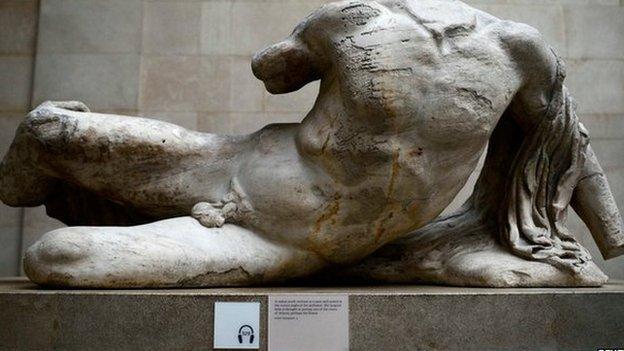Elgin Marbles: New body aims to return sculptures to Greece
- Published
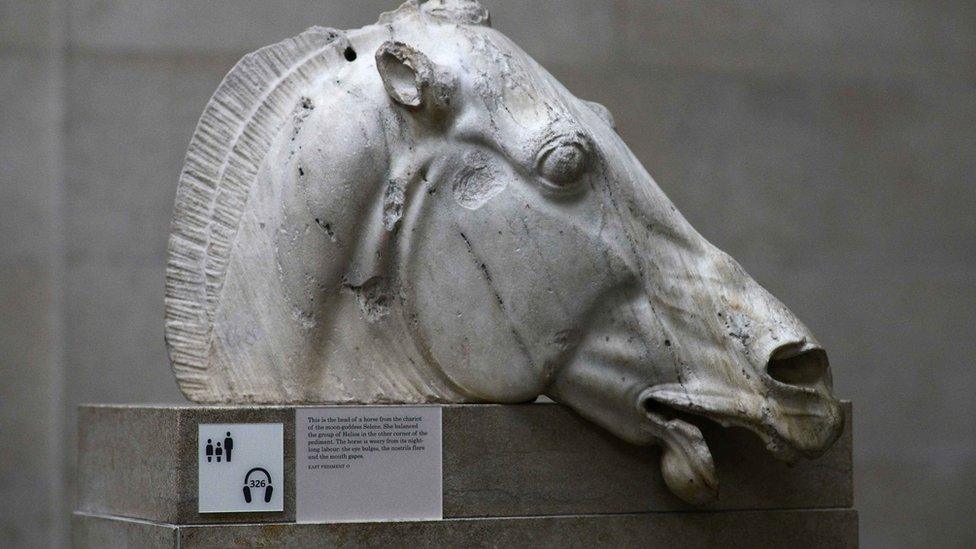
The works traditionally referred to as the Elgin Marbles are increasingly becoming known as the Parthenon Sculptures
A former Conservative culture minister will chair a new body aiming to return the so-called Elgin Marbles to Greece, the BBC can reveal.
Lord Vaizey, culture minister from 2010-2016, says he is confident "a deal is within reach".
On Thursday, the House of Lords will debate an act which restricts museums from disposing of objects in their collections.
The government said it had no intention of changing the law.
The Department for Digital, Culture, Media and Sport said: "The British Museum is prevented by law from removing objects from its collections, except in some narrow circumstances. The government has no plans to change this act."
The Elgin Marbles are currently housed in the British Museum.
In a statement, the museum said: "We will loan the sculptures, as we do many other objects, to those who wish to display them to the public around the world, provided they will look after them and return them.
"Deepening public access and understanding, creating new ways and opportunities for collections to be shared and understood right across the world, and forging connections between the present and the past, remain at the core of what the British Museum seeks to achieve," they added.
Asked recently about a potential deal that could lead to the return of the sculptures to Athens, Prime Minister Liz Truss said: "I don't support that."
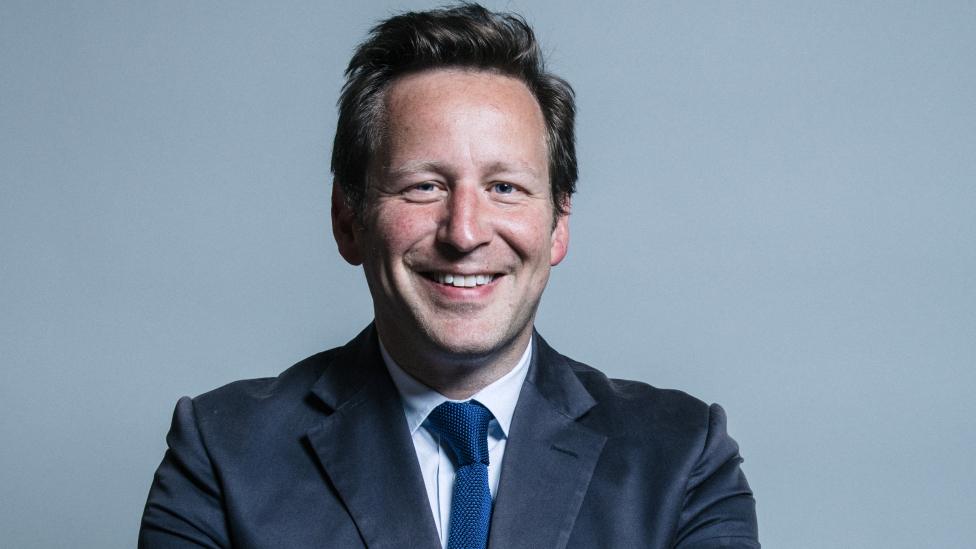
Former culture minister Ed Vaizey will chair the new board aiming to return the sculptures to Greece
The fate of the Parthenon Sculptures, as they are more frequently becoming known, is the most high-profile in the hotly contested debate about whether museums should return items in their collections to their countries of origin.
For years, Greece has lobbied to bring the sculptures home. They were removed from Greece's Parthenon temple in the early 19th Century by the Scottish soldier and diplomat, Lord Elgin.
The British Museum has always said that only the government can decide their fate, though the government says the "collections are a matter for the trustees".
Now an advisory body plans to campaign for a "win-win" deal as a poll shared exclusively with the BBC appears to show the majority of British people support sending the Marbles home.
Lord Vaizey is joined by other founding members on the advisory board of the Parthenon Project, an organisation founded by the Greek businessman John Lefas.
The board also includes two other Conservative peers, the renowned author Lord Dobbs and Baroness Meyer. They're joined by Stephen Fry and the journalist Sarah Baxter.
The former Conservative Chancellor, George Osborne, now chairman of the British Museum, said earlier this year a "deal is to be done", though the current Conservative administration appears less keen.
A poll of nearly 2,000 people, commissioned by the Parthenon Project, suggests while 16% of the British public think the Parthenon Sculptures should stay in Britain, 54% think they should be returned.
The strongest reason for supporting the return was because they "rightfully belong to Greece".
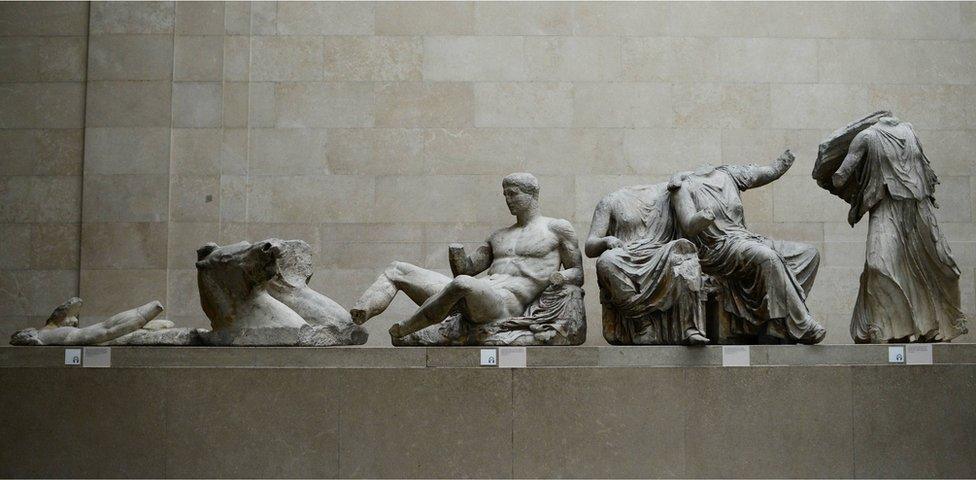
Polling suggests a majority of British people would support returning the Elgin Marbles to Greece
The Parthenon Project points to a breakdown of the poll which shows, amongst people who voted Conservative in 2019, 44% thought the sculptures should go to Greece and 28% did not mind either way.
Lord Vaizey, new Parthenon Project chair, said: "I am confident that a deal is within reach. Support for the reunification of the Parthenon Sculptures in Athens from the public, and in particular Conservative-leaning voters, is clear."
He added it would be "in the best interests of the British Museum and UK government to begin meaningful engagement on this issue".
On Thursday, Lord Vaizey will prompt a debate in the House of Lords about the National Heritage Act.
With growing calls from some quarters to return items held in British collections to their original countries of origin, some museums, including the V&A, run by Tristram Hunt, have called for the act to be amended or replaced.
The British Museum says it is restricted from returning items from its collection, including the Benin Bronzes from Nigeria, by another act, the British Museum Act of 1963. It has similar terms to the Heritage Act.
Other smaller museums are not bound by the same restrictions. London's Horniman Museum recently announced it was returning its collection of Benin Bronzes. These items were looted by British forces in the late 19th Century.
Glasgow Museums has also agreed to return seven stolen artefacts to India.
The Parthenon Project believes a cultural exchange is a solution to the stalemate over the Elgin Marbles.
Fry said he was "delighted" to be supporting the Parthenon Project, adding: "I firmly believe that we now have a real chance to find a solution that benefits both Britain and Greece. It is time to put our energies into an exchange involving a revolving collection of never-seen-in-London before artefacts populating the Duveen Gallery in the British Museum, whilst the sculptures are returned to Greece."
Correction 13 October: This article has been amended after an earlier version reported that previously the British Museum has argued that the sculptures should remain in London because there's nowhere to house them in Greece and the Greek authorities can't look after them. In fact the British Museum specifically highlight that this is a misconception and so we have removed this paragraph from the story.
Related topics
- Published4 December 2024
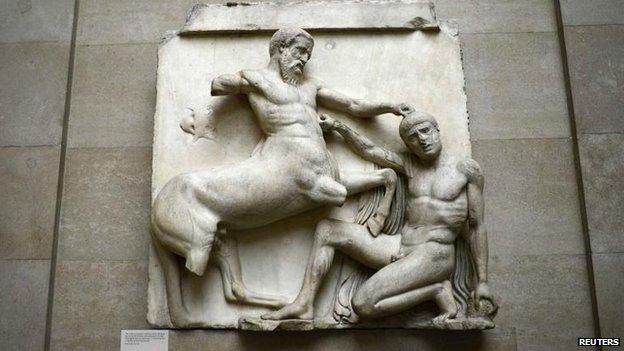
- Published14 May 2015
